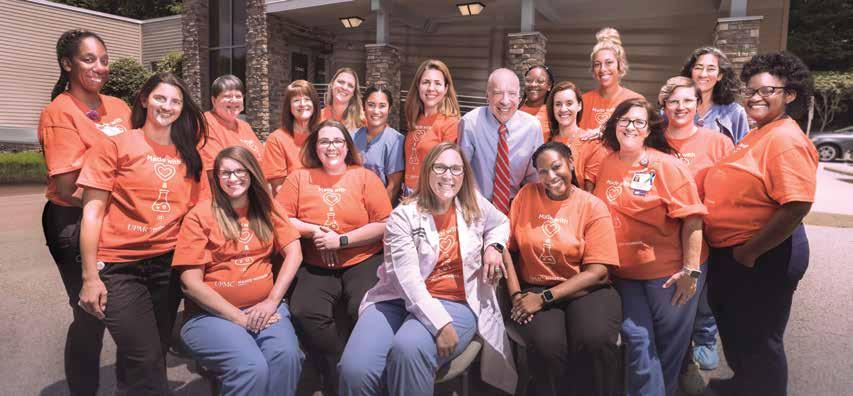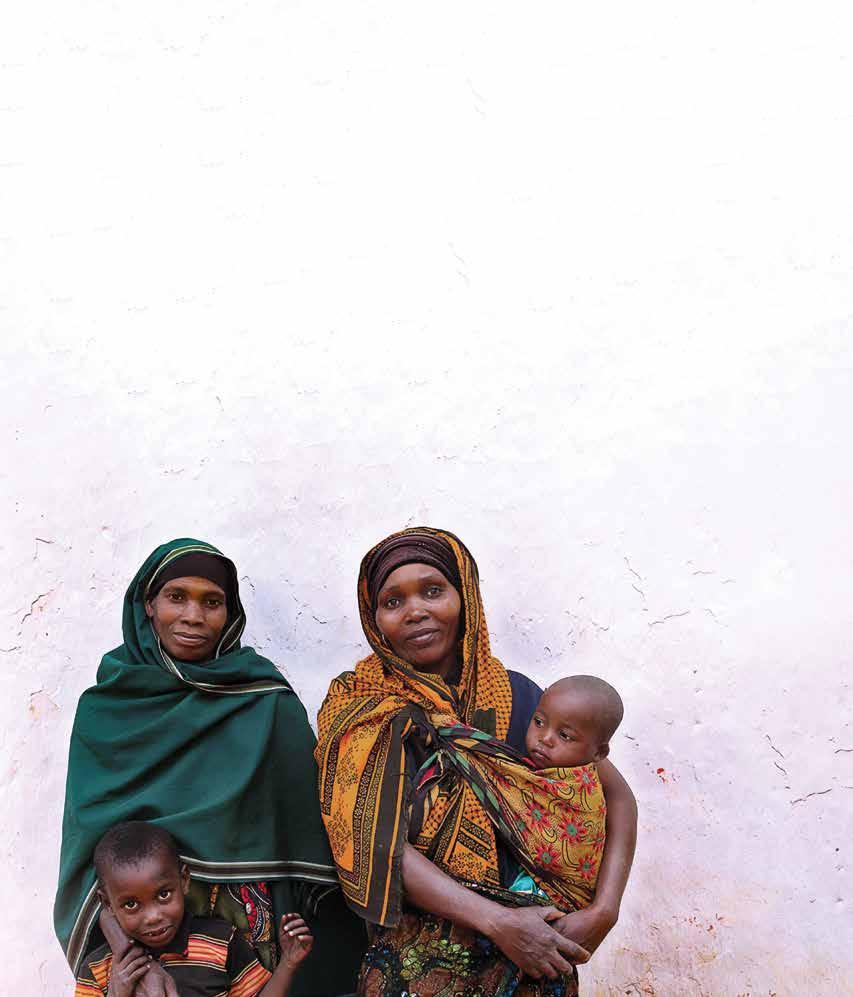MAGEEMATTERS
Transforming the Future of Women’s Health and Reproductive Sciences





Over the last few years there has been one constant: change. Not only have health care service lines at UPMC MageeWomens Hospital adapted to meet evolving demands of a post-pandemic world, but so have our research efforts across the street at Magee-Womens Research Institute. We are moving deliberately, swiftly, and collaboratively as we continue to deliver premier care experiences and advance research in women’s health and reproductive sciences.
As part of our responsiveness to the changing climate, UPMC is launching a new division, Community and Ambulatory Services, to expand and streamline access to primary care, outpatient specialty services, ambulatory, in-home services, and other non-hospital-based community services. In addition to my current role as chair of Obstetrics, Gynecology & Reproductive Services, I will also serve as the chief medical officer of this newly created division. We anticipate that it will complement and leverage UPMC’s world-class capabilities to meet the needs of our patients, members, and the communities we serve. In addition, Annmarie Lyons was named our new executive administrator; she replaces Jeff Knorr, who had been in the role since 2016. Ms. Lyons comes to us with a wealth of experience as a senior administrator for over 20 years at UPMC. Mr. Knorr moved into a new role leading the Anesthesia and Otolaryngology programs. Due to my extended duties, Dr. Hy Simhan’s role as my executive vice chair will expand to include overseeing operational programs at Magee.
Change is not only happening at the system or leadership level. Throughout Magee, our teams of providers are working to innovatively address some of the toughest challenges and disparities in health care. Our Division of Reproductive Endocrinology and Infertility (REI), led by Dr. Julie Rios, has adapted to meet a rapidly rising demand for fertility services. Through enhanced education, protocols, training, and collaborations with oncofertility care and research programs, the REI division is addressing some of our patients’ most urgent and nuanced fertility care needs (p.5).
Magee’s workforce development commitment to drive diversity, equity, and inclusion in recruitment and retention of trainees has also made significant strides, led by ombudsperson Dr. Sarah Napoe. We aim for our program to ensure that all residents and fellows here at Magee, particularly those from underrepresented backgrounds, are welcomed and supported along their professional journeys (p.8). On the research side, the latest finding from the Microbicide Trial Network’s DELIVER study on the safety of the dapivirine ring in pregnant patients represents a major landmark in the development of HIV prevention products (p.10).
We are proud of the advances we have made at Magee and inspired by our alumni’s work in health care settings around the globe. For example, as the sole ob-gyn provider at a federally qualified health center in the Mississippi bayou, Dr. Nina Ragunanthan’s efforts addressing disparities for patients at the Delta Health Center reminds us of the importance of fostering a training ground rooted in health equity and applying community-based approaches to address complicated issues (p.3). With the return to more frequent in-person events, we always look forward to reconnecting with Magee alumni at conferences and events held throughout the year (p.13).
As a member of this esteemed community, we hope that you will stay connected with the latest happenings here at Magee. One way that you can support the program is through the Steve Caritis Endowed Obstetrical Research Fund for Residents & Fellows, which encourages obstetrics research among trainees. Learn more about the fund and how to support it by contacting Jessica Rock at rockjj2@mwri.magee.edu or 724-272-2026. To stay updated on all things Magee, follow @MageeWomens on social media.
Thank you for reading, and for continuing to be a source of pride and inspiration for all of us here at Magee.
Best regards,
 by Faith Jeffcoat
by Faith Jeffcoat
“I’m working every day to transform women’s health care in one of the highest areas of need in our country,” says Dr. Nina Ragunanthan, an ob-gyn provider in the rural Mississippi Delta.
Dr. Ragunanthan, a Magee alumna, is at the forefront of changing care for her patients. Disparities are present in health care across the country, but the Mississippi Delta is an area where the inequities nested within the health care system are particularly evident. She addresses these issues by creating tangible change for her patients, guided by a belief in health equity — where providers aim to address longstanding social determinants of health in clinical settings.
From Passion to Profession
Dr. Ragunanthan’s passion for global health grew from her educational experiences. While attending Duke University to study global health and health care disparities, Dr. Ragunanthan participated in the Robertson Scholars Leadership Program, a program dedicated to developing leaders in service to society. She served one summer with St. Gabriel Mercy Center where she ran a summer camp for children in Mound Bayou, Mississippi. During her studies at Harvard Medical School, she continued to participate in global health equity programs — including working with Partners in Health in Rwanda, an organization co-founded by Paul Farmer, one of Dr. Ragunanthan’s role models.
Through this education and outreach work, Dr. Ragunanthan fell in love with obstetrics and gynecology. When considering residency programs, she sought a place that would provide top training for generalists. She was thrilled to match with UPMC Magee-Womens Hospital, where she completed her four-year residency. While at Magee, she also spent time in Kenya with Dr. Jennifer Makin, an ob-gyn specialist at UPMC Magee, through a global health rotation as a third-year resident.
After completing her time at Magee, Dr. Ragunanthan and her husband Dr. Braveen Ragunanthan, a primary care pediatrician, decided to return to an area where they could address health care disparities head-on: the Mississippi Delta. “We had fallen in love with the Delta while in college, and we both felt called to serve this incredibly high-need area,” says Dr. Ragunanthan.
Addressing Disparities at the Delta Health Center
Dr. Ragunanthan is the sole ob-gyn provider at the Delta Health Center (DHC). The DHC is the oldest federally qualified health center in the country and has a rich legacy of addressing social determinants of health and supporting the needs of the community — regardless of the ability to pay. The DHC is in the heart of the Mississippi Delta — an area with a severe physician shortage and with that, a severe lack of subspecialty services. According to a report by NPR, the Mississippi Delta is a “Maternity Care Desert,” as many of Mississippi’s counties do not have obstetric hospitals, birth centers, or obstetric providers.
Working in a close-knit community offers continuity with patients — something that is hard to maintain in mainstream health care. “I get to know my patients and their families well. A lot of the time I get to work with multiple generations, which is rewarding.”
Dr. Ragunanthan credits her residency at Magee for helping her prepare for this role. “I use the training that I got at Magee every day, especially my training in highrisk obstetrics. I really value that training as someone who is now taking care of a lot of very high-risk pregnant patients,” Dr. Ragunanthan says. She also values her gynecologic surgery training immensely, adding, “I am the only ob-gyn at my hospital that performs laparoscopic hysterectomies.”
Dr. Ragunanthan also notes, “In addition to the training, I still rely on my Magee community for advice on cases. As I am the sole ob-gyn provider at the DHC, I don’t have that local support.”
Though there are many areas to tackle in driving for more equitable health care in the area, Dr. Ragunanthan focuses on one tangible action at a time that can create lasting systemic change.
Continued on next page
Robert P. Edwards“My biggest accomplishment in my first year was advancing contraceptive access in the clinic,” she says. When Dr. Ragunanthan got to the DHC, they did not offer LARC (long-acting, reversible contraception) devices in the clinic. For example: if someone wanted an IUD or a Nexplanon arm implant, that device would have to be ordered for them. “And in that waiting time, someone could get pregnant,” she explains. “We’re in a place with one of the highest teen pregnancy rates in the country and giving a teenager or young woman access to a LARC can really change the trajectory of her life.”
In addition to Dr. Ragunanthan’s efforts on enhancing care for high-risk obstetrics and improving contraception access in the DHC, she aims to expand her reach beyond the clinic. Dr. Ragunanthan recently conducted a ‘Lunch and Learn’ session for nurse practitioners in the community to teach attendees about contraception. She also persuaded two pharmacies to stock the emergency contraception pill Ella (ulipristal acetate) in their stores, which was previously unavailable in the region.
While Dr. Ragunanthan focuses her efforts on her local community, there are disparities to address all over the country and the globe. For others wishing to work on these issues, Dr. Ragunanthan encourages pacing yourself, as addressing the needs of high-risk patients requires a multifaceted approach.
“What feels like an insurmountable problem or set of problems, it is best to just take things one small step at a time,” Dr. Ragunanthan says. “If you or someone you know feels a calling to do that, then I really encourage you to go for it. We create the change we want to see in the world.”
In their third year of residency, UPMC Magee-Womens Hospital residents can do an elective rotation with Dr. Ragunanthan at the Delta Health Center. This rotation provides residents with valuable experience working in a rural setting with desperate need using limited resources. To learn more, residents may reach out to Dr. Ragunanthan directly at nina.w.ragu@gmail.com.
In the last decade, fertility care delivery has had to adapt — to pandemic restrictions, to rapid technology shifts, and to a cultural sea change that has driven more patients than ever before to seek out reproductive guidance.
Dr. Julie Rios heads the Division of Reproductive Endocrinology and Infertility at UPMC Magee-Womens Hospital. Since assuming the division chief role in summer of 2021, she has guided the department in meeting the evolving needs of patients in a shifting health care climate.

Though this backlog of patients from COVID has subsided and there is no longer a lengthy waitlist, that was only one part of the challenge: the adoption and scaling of telemedicine during the pandemic also quickly ushered in a new normal across all health care service lines.
Since then, overall demand for fertility services has skyrocketed, owing to several factors, including new tests and technologies, social media trends, and expanded insurance coverage for certain services.
Clinical tests developed over the last decade have influenced an increase in demand for some analyses — specifically when it comes to preimplantation genetic testing or evaluating cells from an embryo to identify abnormalities early in the process. Previously, such testing was done on one cell of an eight-cell embryo. Nowadays, the embryo is cultured longer, into the blastocyte stage, which is comprised of hundreds of cells — of which five to ten cells are tested — offering a higher degree of accuracy.
However, such advances are not without controversy, as Dr. Rios explains: “Should we do [preimplantation genetic testing] for all patients during In-Vitro Fertilization (IVF)? Do younger patients really need it? Are there risks with it? And I think that’s still a debate going on in our field.”
A surge of interest in at-home DNA genetic testing a la 23andMe has also resulted in patients requesting services to avoid passing on certain characteristics, for example. Dr. Rios adds that social media has complicated matters, as patients will request specific procedures they have heard about online that may not be evidence-based or likely to succeed. In other cases, patients may be working with a specialist outside of the ob-gyn field, who may recommend treatments that can be costly and have significant risks.
“It is a very expensive and emotional invasive process that patients go through,” Dr. Rios says. “You want to have a shared decision-making model with them, but there must be a balance between patient autonomy and physician expertise.”
When conflicts in courses of action arise, it is a balancing act for providers to ensure patients feel heard but are also counseled toward an appropriate medical recommendation. She says that their division uses tools like an online calculator to predict the success of a given procedure like IVF, which can open up conversations about the best courses of action, particularly given the patient’s insurance options.
“I do think insurance coverage comes into account for this. Someone that has a 10% success rate, but it’s fully covered is going to take that chance and could be successful. Then, someone else that must pay for two or three cycles out of pocket may not want to spend $60,000 for a 30% success rate,” she says.
While Dr. Rios says that the bulk of the patient volume in the department is for infertility services, she is also seeing an uptick in interest in services like egg preservation.
“Cost comes into everything we do. More and more companies are covering fertility preservation or just covering our services,” she says. “As we see more coverage, we’re going to have more patients doing it. I also think that there’s more interest, and more people understanding that it’s quite successful.”
Beyond her work in the clinical space, Dr. Rios works with researchers at Magee-Womens Research Institute on fertility preservation efforts for specific patients.

“We have a great team that collaborates between [Dr. Kyle Orwig’s] team at the Center for Reproduction and Transplantation (CRT) and our team at the Center for Fertility and Reproductive Endocrinology (CFRE),” Dr. Rios says.

If the patient is interested in egg freezing, they will work with Dr. Rios’ team. If patients are unable to do egg preservation and have ovarian tissue, they can pursue that preservation option through the CRT. Patients with testes primarily work with the CRT, but the CFRE will review the semen analysis and help the patient understand the information about their specimen. If patients cannot bank sperm, they can do the research protocol, which is testicular tissue cryopreservation.
“We also work with Dr. Hwang in our Men’s Health Center, who could potentially then see these patients to do other fertility preservation procedures that maybe aren’t under a research protocol,” she says.
“We essentially have a multidisciplinary team where we’re all managing the patient so they can get what they need.”
This sentiment also goes for patients who have had chemotherapy for cancer, or any medical condition requiring gonadotoxic treatment. Through these teams, patients receive information about how their fertility could be affected, and what options they have to preserve it.
“They’re going to have potentially lifelong effects: they could go through menopause early and need hormone replacement,” she says. “That clinic is there to support those patients. It’s a great checkpoint, so that they understand how they could use their eggs or their tissue.”
As leader of the REI Division, Dr. Rios has worked to institute communication protocols so that patients receive continuous care experiences even if their provider is out of the office. Dr. Rios and her team are also working on an FAQ educational series so that the most common questions from patients are already answered before they walk in the door.
“Every patient is an individual, so they’re not going to fit into every single protocol,” Dr. Rios says. “But there are some basic standards we can make, and we individualize from there.”
These streamlined processes facilitate another tenet of Dr. Rios’ focus as a leader: provider wellness.
“In general, I’m trying to overall make our staff, our physicians, our providers — everyone to have more wellness. We want to feel like we’re taking care of these patients, but also making sure like when you’re not here, you’re able to spend time with your family,” she explains.
Finding this balance for providers is especially important given the current outpacing of demand to supply of reproductive endocrinologists. More advanced practice providers (APPs) are being trained in certain aspects of care in the REI Division to offset the demand and they work closely with physicians to provide excellent care to patients.
“In general, I’m trying to overall make our staff, our physicians, our providers — everyone to have more wellness.”
— Dr. Julie Rios
In looking toward the future of the division, Dr. Rios hopes to build for long-term research as well as establishing great patient education and patient relations — to provide great care. As pregnancy rates have risen in the division, she is encouraged by the progress and examining ways to keep them improving.
Dr. Rios says that ultimately, the goal is leading toward patient-specific care:
“We’re looking forward to collaborating with our patient population, MWRI, and within industry to contribute to the science and to try to make fertility outcomes better and more individualized for every patient.”
“When I came here, we had over 1,000 patients on the wait list of people getting in to see us,” Dr. Rios says.Dr. Julie Rios Team members of the Magee Division of Reproductive Endocrinology & Infertility.
Inequality creates mistrust in the health care system. According to the NIH, when providers lack diversity, patient care suffers, and so does research.
As an ombudsperson for the Department of OB/GYN/RS at UPMC Magee-Womens Hospital, Dr. Sarah Napoe works to eliminate this mistrust by fostering a community of diversity, equity, and inclusion for trainees.
Dr. Napoe serves as a listener and advocate for those in the Department, specifically the underrepresented.

One way she supports residents within the department is by helping them navigate and process microaggressions in a professional setting. Dr. Napoe says, “It can be difficult to confide in someone something negative you experienced, especially when it is written off as minuscule, so I work to be an ear and acknowledge what they’ve experienced.”
Dr. Napoe’s work includes assembling a diverse workforce of residents and fellows at UPMC Magee. At the point of recruitment, Dr. Napoe will reach out to potential residents and answer their questions about diversity, equity, and inclusion to ensure incoming members know that if they come to UPMC Magee, it will be a supportive place for them. But it can be tough when potential residents do not see themselves reflected in the lineup of faculty with whom they will train.
“We need more faculty of color,” says Dr. Napoe. “When trying to recruit residents, it is challenging to assure support for minorities when we don’t have many faculty of color.”
A report released by the Journal of the American Medical Association reveals racial disparities in the composition of residency training programs. Of residents entering obstetrics and gynecology in the United States, only 7.9% are Black, 10.1% are Hispanic, and 0.1% are Native American or Alaska Native.

“People must see themselves in a position to believe they can do it well. When students don’t see physicians like themselves, it makes it difficult to see a path forward,” says Dr. Napoe.
The passion Dr. Napoe brings to her role stems from her journey to becoming an ob-gyn provider, as she personally experienced the effects of the lack of diversity in the medical field.
“I was a little bit surprised by how underrepresented some groups are in medicine. When I was thinking about going to medical school, I heard often that I would not be accepted,” she says. “It can be hard to believe you are good enough when there isn’t representation of people like yourself in the field doing what you want to do. But I looked around at how many physicians there were and realized that if all those people could do it, so could I.”
Long-term, Dr. Napoe wants to continue helping build a workforce that reflects the community it serves.
“I want to see Magee continually increasing our number of minority faculty. One of the ways to do this would be to have a training program that looks more like the city it serves. Our training and retention are crucial for improving disparities and diversifying Magee.” She adds, “We really want to serve our patients well in this community, and a way we can do that better is when we retain some of the minorities that we’ve trained to serve our patient population.”
Since assuming the role of an ombudsperson in 2020, Dr. Napoe has seen an increase in the diversity of the residency program. “The last couple of years, we’ve had two of the most diverse entering intern classes, probably in decades. We’ve done great work,” she says.
Every step is ensuring the climate of Magee is positive for medical students. With the increase in diverse recruiting, Dr. Napoe would also like to see an increase in retention from underrepresented University of Pittsburgh medical students. “You know that the place is a good place to be when people who’ve trained with you want to stay — especially underrepresented minorities,” she says.
“People must see themselves in a position to believe they can do it well. When students don’t see physicians like themselves, it makes it difficult to see a path forward.”
— Dr. Sarah NapoeDisparities in health care create ripple effects beyond the individual. “When disparities prevail, everything suffers and this leads to inadequate care for many and an increase in health care costs for all — it’s all connected,” says Dr. Napoe.
Through her efforts in Diversity, Equity, and Inclusion, Dr. Napoe is on a mission to create lasting systemic change in health care — one student at a time, starting here in Pittsburgh.
“Magee is a great place to train,” Dr. Napoe adds. “I am proud of the work that we have been able to do and look forward to our continued efforts to make Magee the dream training program for students of all backgrounds.”
Because of the complexities of studying the safety of a then-investigational drug in a pregnant population, MTN held a large stakeholder meeting to seek support and input on the study design with key decisionmakers from the countries in which the study was to be conducted: South Africa, Malawi, Uganda, and Zimbabwe. Follow-up meetings also engaged community leaders and local Institutional Review Boards (IRBs).
The DELIVER study operated in a stepwise fashion — enrolling one group at a time and submitting data to be analyzed and approved by an independent safety review panel before moving onto the next stage. They began the trial with women late in the third trimester who used either DVR or oral PrEP until delivery, and then moved onto the second group, who were early in their third trimester. Finally, DELIVER moved into the last group of women in the second trimester. At each step, staff members carefully explained the study to prospective participants and worked with the community at large to address any concerns.
“This is a Game Changer.”
Several African countries have approved DVR, and it has been recommended by the World Health Organization for women at high risk of acquiring HIV. Other products that have been approved for HIV prevention include a daily pill and an injectable medication administered every two months.
DVR is a landmark advancement in HIV prevention products, particularly as it is the first womancontrolled method.
“Many women do not have the ability to negotiate condom use with their partners, so this is a game changer,” Dr. Bunge says. “The dapivirine vaginal ring is discreet — nobody needs to know you are using it — comfortable, and inexpensive to scale up. Because the medication is released exactly where it is needed but not absorbed into the bloodstream in significant quantities, the risks of systemic side effects and HIV drug resistance are almost nonexistent.”

Imagine a scenario where a pregnant woman comes to her physician seeking an HIV prevention method. Instead of the clinician saying things like, ‘Well, it was safe for pregnant mice.’ or ‘It’s safe in non-pregnant people.’, they can say with confidence, ‘This product was studied in pregnant people just like you, and there were no safety issues identified.’
This ideal scenario is the goal, as pregnant people need safe HIV prevention products. Yet, historically, pregnant and breastfeeding people have been excluded from clinical trials, which is a big problem: pregnancy represents a period of increased HIV risk for both hormonal and behavioral reasons. In fact, pregnant people are three times more likely to acquire HIV than their non-pregnant counterparts.

The Microbicide Trials Network (MTN), under the direction of MWRI researcher Sharon L. Hillier, PhD, set out to address this problem directly by proposing a safety trial of a novel HIV prevention product in pregnancy. The DELIVER trial is evaluating the safety of both the dapivirine vaginal ring (DVR) and oral pre-exposure prophylaxis (PrEP).
DVR is a silicone ring containing an HIV medication called dapivirine. It is inserted into the vagina and stays there for one month, at which point the old ring is replaced with a new ring. Over the course of the month, the ring slowly releases the anti-HIV
medication, which protects women from acquiring HIV through vaginal sex. Currently, it is approved only for non-pregnant, non-breastfeeding individuals, ages 18 to 45.
It is highly unusual to actively study the safety of a drug in a pregnant population. Typically, a drug is approved for non-pregnant people, and when a pregnant patient needs the medication, the doctor and patient must assess the risk-benefit ratio based on limited safety data in humans.
Dr. Katherine Bunge, an MWRI researcher and protocol chair of the DELIVER study, says she understands why many people would assume that such a study could not be done.

“In my experience, pregnant people don’t want to take any medication — let alone a medication that has not been studied thoroughly in pregnancy,” Dr. Bunge says. “The truth is, though, people who have enrolled in the trial recognize that they are at risk for HIV and are looking for a prevention method that fits into their life.”
Ultimately, the DELIVER study found that women can safely use the dapivirine vaginal ring for HIV PrEP in the third trimester of pregnancy. A sister trial evaluated and confirmed that DVR is also safe to use during breastfeeding. Dr. Bunge presented the pregnancy outcomes and complications from the first two groups at the 30th Conference on Retroviruses and Opportunistic Infections (CROI), a national HIV conference. MTN’s methodical study design on an investigational product in a pregnant population could be used as a model for other drugs.
For years, pregnant people have been excluded from clinical trials. But MWRI researchers are at the forefront of women’s health research: pushing boundaries, imagining the unimaginable, and prioritizing the health of women. The DELIVER trial is an example of this commitment to change.
“A lot of people will say that studying the safety of an investigational product in pregnancy is too hard and too expensive,” Dr. Bunge says. “The DELIVER trial demonstrates that it can be done.”
DVR is a landmark advancement in HIV prevention products, particularly as it is the first womancontrolled method.
Hands
Dapivirine ring proven safe to use in third trimester of pregnancyDr. Katherine Bunge
Incoming Fellows
Complex Family Planning Fellowship
Amanda Lacue, MD
Obstetrics & Gynecology
Cooperman Barnabas Medical Center, Livingston, NJ
Family Medicine Obstetrics Fellowship
Laila Younes, MD Family Medicine
AMITA Health Saints Mary & Elizabeth Medical Center, Chicago, IL
Female Pelvic Medicine & Reconstructive Surgery (Urogynecology) Fellowship
Nicole Meckes, MD
Obstetrics & Gynecology
UPMC Medical Education, Pittsburgh, PA
Gregory Zemtsov, MD
Obstetrics & Gynecology
Duke University, Raleigh, NC
Gynecologic Oncology Fellowship

Megan Lander, MD Obstetrics & Gynecology
The Johns Hopkins Hospital, Baltimore, MD
Amanda McDonald, MD Obstetrics & Gynecology
The McGaw Medical Center of Northwestern University, Chicago, IL
Laboratory Genetics & Genomics Fellowship
Marwa Daghsni, PhD
PhD in Human Biology University of Tunis El Manar, Tunisia and Université Grenoble, Alpes, France
Maternal-Fetal Medicine Fellowship


Lauryn Adams, MD Obstetrics & Gynecology NewYork-Presbyterian Hospital, New York City, NY
Elena Lands, MD
Obstetrics & Gynecology
Brigham and Women’s Hospital and Massachusetts General Hospital, Boston, MA
Reproductive Endocrinology & Infertility Fellowship
John “Wes” Urian, MD Obstetrics & Gynecology Oregon Health & Science University, Portland, OR
Incoming Residents
Oluwafunmilayo “Funmi” Eletu University of Virginia School of Medicine
Josselyn Flores-Galdamez, MS New York Medical College
Erin Galakatos University of Missouri-Kansas City School of Medicine
Gabrielle LeBlanc Florida State University College of Medicine
Margaret “Rosie” Mahoney Vanderbilt University School of Medicine
Aja Pollard University of Pittsburgh School of Medicine
Katelyn Ripple University of Pittsburgh School of Medicine
Kara Shannon Baylor College of Medicine
Kathryn “Kate” Smith Northwestern University Feinberg School of Medicine
Amanda Thiele University of Miami
Leonard M. Miller School of Medicine
New Hires 8/2022 to 1/2023
Alayna Butcher, MD
8/1/2022, NIA OB/GYN Associates
Caitlin Durr, MD
8/1/2022, UPMC Hamot
Shea Soberdash, DO 8/1/2022, UPMC Horizon
Nicole Garcher, DO
Conor Corcoran, MD
9/1/2022, OGAP
Stephanie Glass-Clark, MD
9/1/2022, Urogynecology
Shannon Hershman, CNM
9/1/2022, UPMC Horizon
John Karvounides, DO
9/1/2022, UPMC Womancare Associates, East
Kelly Kline, CNM
9/1/2022, UPMC Altoona
Cassandra Ondeck, MD
9/1/2022, UPMC Womancare Associates, South
Pamela Parker, MD
9/1/2022, REI
Shannon Rush, MD
9/1/2022, Gyn-Oncology



Kelly Snyder, DO
9/1/2022, UPMC Womancare Associates, South
Pritha Workman, MD
9/1/2022, NIA OB/GYN Associates
Nikole Bucsek, MD
10/1/2022, UPMC Hamot
Alexandra Buffie, MD
10/1/2022, NIA OB/GYN Associates
Rachel Ivancie, CNM
10/1/2022, NIA OB/GYN Associates
Joel Messom, MD 11/1/2022, UPMC Altoona
Megan Wright, MD
12/1/2022, UPMC Womancare Associates, East
Panayota Zarmakoupis, MD 1/1/2023, REI
Retirees 9/2022 to 12/2022
Robert Gedekoh, MD 9/30/2022, Gynecology
Emily DeFerrari, CNM 10/30/2022, NIA OB/GYN Associates
Friday, October 28, 2022, UPMC Magee-Womens Hospital
AAGL Alumni Reception


Thursday, December 1, 2022
Aurora, Colorado
SMFM Alumni Reception


Tuesday, February 7, 2023
San Francisco, California




Tuesday, February 28, 2023, National Harbor, Maryland
North American Menopause Society (NAMS)
2023 NAMS Annual Meeting
September 27-30, 2023
Philadelphia, PA
American Urogynecologic Society (AUGS)
2023 PFD Week
October 4-6, 2023
Portland, OR | Virtual
Society of Family Planning
2023 Annual Meeting
October 28-30, 2023
Seattle, WA
American Association of Gynecologic Laparoscopists (AAGL)
52nd Global Congress
Monday, March 27, 2023, Tampa, Florida
November 5-9, 2023
Nashville, TN
The Society for Maternal Fetal Medicine (SMFM)
44th Annual Pregnancy Meeting
February 10-14, 2024
National Harbor, MD
Council on Resident Education in Obstetrics and Gynecology (CREOG)
2024 CREOG & APGO Annual Meeting
February 28-March 2, 2024
San Antonio, TX
Society for Reproductive Investigation (SRI)
2024 Annual Meeting
March 12-16, 2024
Vancouver, Canada
Society of Gynecologic Oncology (SGO)
2024 Annual Meeting
March 16-19, 2024
San Diego, CA
Society of Gynecologic Surgeons (SGS)
50th Annual Scientific Meeting
March 24-27, 2024
Orlando, FL
American Society for Colposcopy and Cervical Pathology (ASCCP)



2024 ASCCP Scientific Meeting
May 2-5, 2024
New Orleans, LA
American College of Obstetricians and Gynecologists (ACOG)
2024 Annual Clinical & Scientific Meeting (ACSM)

May 17-19, 2024
San Francisco, CA
American Society for Reproductive Medicine (ASRM)
80th ASRM Scientific Congress & Expo
October 19-23, 2024
Denver, CO
UPMC Magee-Womens Hospital offers one of the most robust ob-gyn training programs in the nation. We are proud of our Magee residents and alumni; in future issues of Magee Matters, we will be introducing a class notes section where you can share your updates with fellow alumni. If you trained at UPMC Magee and have a story to share about how you’re applying those skill sets within your practice, we would love to hear from you — and possibly feature your update in an upcoming issue of this newsletter.
Help us keep you informed! Please join our email list to stay up to date on the great things happening at Magee. To get on the list, email Jessica Rock, rockjj2@mwri.magee.edu or call 412-641-4008
@MageeWomens @MWHObGynAlumni
MageeWomens.org
Please fill out the Class Notes form by scanning this QR code:

So many lives to touch.
Three ways to give.
